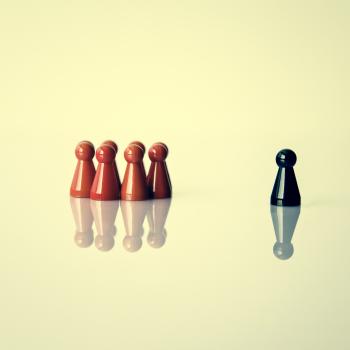I’ve been disturbed before by the startingly ahistorical assumptions modern westerners make about their ancestors—the presumption that the people who came before us must have, in many ways, thought and felt like us. (And yes, those conversations always sooner or later return to attitudes about sex). The form this usually takes is a kind of scepticism – any culture or age that claimed a virtue or ability that we lack is often assumed to be duplicitous or hypocritical. Our historical dramas are full of men and women that are dressed to suit a time period, but whose motivations, thoughts and mores are indistinguishable from our own, albeit perhaps suffering under unreasonable societal standards that of course the heroine or hero does not share.
Someone on my Facebook recently linked to an article entitled, “Why Americans Are the Weirdest People in the World,” about some anthropologists who discovered that some of the things that psychologists and anthropologists think they ‘know’ about human nature turn out to only apply to a very small sliver of humanity: us.
When put through the same studies that we considered conclusive evidence of various “human” traits, groups from different communities and cultures performed very differently. Human nature and cognitive function, it seems, are not so much innate to our species, as learned.
Here’s a taste of what they found:
“We are just at the beginning of learning how these fine-grained cultural differences affect our thinking. Recent research has shown that people in “tight” cultures, those with strong norms and low tolerance for deviant behavior (think India, Malaysia, and Pakistan), develop higher impulse control and more self-monitoring abilities than those from other places. Men raised in the honor culture of the American South have been shown to experience much larger surges of testosterone after insults than do Northerners. Research published late last year suggested psychological differences at the city level too…”
This makes a lot of sense to me, since I encountered this article hot on the heels of reading “The Brain that Changes Itself.” Much of the way we reason is based, not so much on conscious deduction and explicit decision, but on repeated association and unconscious repetition, forming proximate neural nodes which then ‘fire’ together. (The neurons that fire together, wire together). Our normal mode of thinking is not deductive logic, but what John Henry Newman called illative sense. We fill in the picture according to what we have experienced and observed around us, without being necessarily conscious that there were gaps in our vision to begin with.
The quote above references a cultural difference in self-control (a subject I am very interested in, given the impulsivity that is a symptom of ADHD). A biologist might argue that the observed difference could be partly or even mostly a matter of inherited traits, and the culture forms to value the traits that are already endemic to the culture. But I’m not sure that culture works that way – among other things, strong external reinforcements usually follow a lack of a desirable trait, rather than affirming ones that are already common. More than that, I think that it is very plausible that a society that offers external reinforcement of a trait should be the perfect ground for training the neural associations that produce that trait.
My research into brain training for ADHD suggests that the best training is incremental, involving challenges of appropriate difficulty to the level of mastery already obtained, that it is positively rewarded with pleasant stimuli, praise, or material gain, that alternate behaviours are discouraged or made impossible while training, like the stroke victims whose functional hand is bound or the child who is taken out of diapers to potty train.
And somehow in here I begin to see the echoes of older theories of pedagogy, of personal growth, of training in virtue. What if our disbelief at the idea of self-control – in commerce, in sexual matters, in appetite, in relationships – has more to do with what our ancestors had that we lack rather than what they lacked that we have? What if our quest for ‘freedom’ to make our own decisions has instead left us with less ability to make decisions at all than our ancestors, who were so reined in with taboos and prohibitions?
More from the article. One researcher mentioned looking for information on the intersection of religion and psychology and coming up empty:
“Why, I asked Norenzayan, if religion might have been so central to human psychology, have researchers not delved into the topic? “Experimental psychologists are the weirdest of the weird,” said Norenzayan. “They are almost the least religious academics, next to biologists. And because academics mostly talk amongst themselves, they could look around and say, ‘No one who is important to me is religious, so this must not be very important.’” Indeed, almost every major theorist on human behavior in the last 100 years predicted that it was just a matter of time before religion was a vestige of the past. But the world persists in being a very religious place.”
The article goes to a different place with this than I do, unsurprisingly. But I want to ponder on this a bit, and invite you to ponder on it too: We think we know what “people” are like—what they want, what they can (and can’t) bear, what they value, how they think. We think we know that famous celibates must have had sex on the side when no one was looking, and that all men have always masturbated in all times and places. We think we know that living in communitarian societies must feel oppressively suffocating, and that the ultimate fulfilment comes in “being yourself” and “doing it your way.” We think we know that the Milgram experiment revealed something horrible about all humans everywhere, and not just college students in a particular time and place. We generalize from the economic behaviour of our own culture and age and think we have stumbled upon economic laws that are as reliable and unchangeable as the laws of nature. And we think that any culture or age that has claims to different mores or standards than our own must—MUST—be lying, because we have made our selves the standard measure of humanity, so we believe ourselves to know more about our ancestors than did our ancestors. But perhaps we have sold them short, and in so doing, have sold our children short.
Perhaps we are the “weird” ones.















